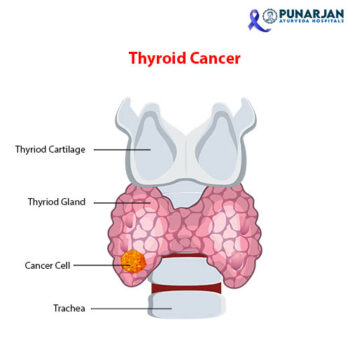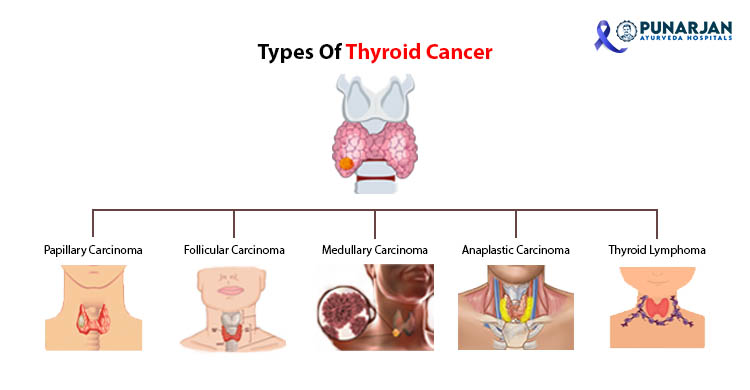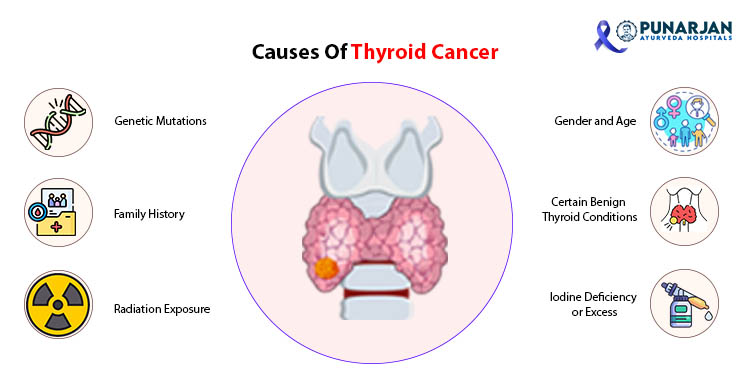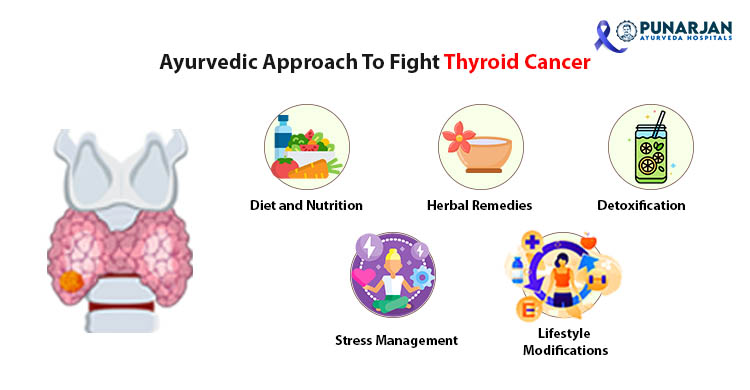Thyroid Cancer
Thyroid cancer is a condition marked by the uncontrollable proliferation of cells within the thyroid gland. The thyroid gland helps in producing hormones that regulate crucial bodily functions. However, when genetic mutations occur within the thyroid cells, they disrupt the normal cell division process and cause rapid multiplication, ultimately leading to the development of a tumor.

Types of Thyroid Cancer

The main types of thyroid cancer include:
- Papillary Carcinoma: Of all thyroid cancer cases, this type of thyroid cancer accounts for about 80% of all thyroid cancer cases. Papillary carcinoma usually grows slowly and tends to affect younger individuals. It arises from the follicular cells of the thyroid gland and often spreads to nearby lymph nodes. It has a high survival rate, with a 10-year survival rate of over 90%.
- Follicular Carcinoma: This type accounts for about 10-15% of thyroid cancer cases. It also originates from the follicular cells of the thyroid gland. Follicular carcinoma tends to be more invasive than papillary carcinoma and can spread to distant organs, particularly the lungs and bones.
- Medullary Carcinoma: Medullary thyroid carcinoma (MTC) arises from the C cells, which produce the hormone calcitonin. About 4% of thyroid cancers are medullary carcinoma. In some cases, medullary carcinoma can be hereditary and associated with specific genetic mutations. It has a much higher risk of spreading to lymph nodes and distant organs.
- Anaplastic Carcinoma: Anaplastic carcinoma is a rare but aggressive type of thyroid cancer. It spreads swiftly and its prognosis is generally poor. Anaplastic carcinoma accounts for about 1-2% of thyroid cancer cases.
- Thyroid Lymphoma: This is a rare form of thyroid cancer that originates from lymphatic tissue within the thyroid gland. Lymphoma can affect the thyroid gland as a primary site or spread to it from other parts of the body.
There are also other variants and subtypes of thyroid cancer, including tall cell variant, insular carcinoma, and poorly differentiated carcinoma. These variants may have distinct characteristics and treatment considerations.
It’s important to note that the treatment and prognosis for each type of thyroid cancer can vary. The specific type and stage of thyroid cancer, as well as individual factors, influence the treatment approach and outcomes. Medical professionals assess these factors to develop personalized treatment plans for individuals diagnosed with thyroid cancer.
Causes of Thyroid Cancer

The researchers have identified certain factors that may increase the risk of developing thyroid cancer. These include:
- Genetic Mutations: Changes (mutations) in the DNA of thyroid cells can lead to uncontrolled cell growth and the development of cancer. Some genetic mutations are inherited, while others occur spontaneously. Specific gene mutations are related with an increased risk of thyroid cancer include RET and BRAF mutations.
- Family History: Any family history related to thyroid cancer, specifically if a parent, sibling, or close relative has been diagnosed with the disease, increases the individual’s risk of developing thyroid cancer. Additionally, certain inherited genetic syndromes like multiple endocrine neoplasia type 2 (MEN2) and familial medullary thyroid cancer (FMTC) further elevate the risk of developing thyroid cancer.
- Radiation Exposure: Any type of exposure to radiation that is of high levels, particularly during childhood, is a known risk factor for thyroid cancer. This can include radiation therapy for head and neck cancers, radiation fallout from nuclear accidents, or radiation exposure during childhood for other medical conditions.
- Gender and Age: Thyroid cancer occurs more frequently in women than in men. Additionally, the risk of thyroid cancer increases with age, with most cases diagnosed between the ages of 30 and 60.
- Certain Benign Thyroid Conditions: Some benign (non-cancerous) thyroid conditions, such as thyroid nodules, thyroid adenomas, or inflammation of the thyroid (thyroiditis), may increase the risk of developing thyroid cancer.
- Iodine Deficiency or Excess: In regions where iodine deficiency is prevalent, there may be an increased risk of certain thyroid cancer types. Conversely, excessive iodine intake, such as through supplements or certain medications, may also be associated with an increased risk.
The interplay of genetic, environmental, and lifestyle factors in the development of thyroid cancer is complex and still under investigation. Regular check-ups, early detection, and prompt treatment are key for managing thyroid cancer effectively.
Symptoms Of Thyroid Cancer
Thyroid cancer can sometimes present with noticeable symptoms, although in some cases, it may be asymptomatic and only detected through routine medical examinations or imaging tests by the best thyroid cancer hospital in hyderabad. Common symptoms of thyroid cancer may include:
- Lump or swelling in the neck: A noticeable lump, nodule, or swelling in the front of the neck is a common symptom. It may be painless or tender to the touch. The lump is typically located where the thyroid gland is situated, that is just below Adam’s apple.
- Hoarseness or voice changes: Thyroid cancer can affect the vocal cords or the nerves controlling them, leading to hoarseness or changes in voice quality.
- Difficulty swallowing or breathing: A large thyroid tumor or the spread of cancer to surrounding structures can cause difficulty in swallowing (dysphagia) or breathing, leading to a sense of constriction or compression in the throat.
- Neck or throat pain: Some individuals with thyroid cancer may experience pain in the neck or throat, which can radiate to the ears.
- Enlarged lymph nodes: Cancer that has spread to nearby lymph nodes may cause the nodes in the neck to become enlarged and palpable.
- Unexplained weight loss: In rare cases, thyroid cancer can cause unexplained weight loss, despite normal or increased appetite.
The above symptoms may be also caused due to various conditions other than thyroid cancer. However, if you experience persistent or worrisome symptoms related to your neck or thyroid, it is important to consult your doctor immediately. They can perform a thorough examination, order appropriate tests, and provide an accurate diagnosis.
Ayurvedic Approach to Fight Thyroid Cancer

Thyroid cancer requires appropriate medical diagnosis and treatment under the guidance of top thyroid cancer hospital in hyderabad or qualified healthcare professionals. Here are some general Ayurvedic principles that can be beneficial:
- Diet and Nutrition: Follow a balanced and nourishing diet that includes whole foods, fresh fruits, vegetables, whole grains, and healthy fats. Avoid processed foods, refined sugars, and excessive salt intake. Specific recommendations may vary depending on an individual’s constitution (dosha) and any concurrent health conditions.
- Herbal Remedies: Certain Ayurvedic herbs may have potential benefits in supporting overall health and immune function. However, it’s essential to consult a qualified Ayurvedic practitioner or herbalist who can recommend appropriate herbs on your health.
- Stress Management: Chronic stress can negatively impact overall health. Ayurveda emphasizes stress reduction through practices such as meditation, yoga, pranayama (breathing exercises), and daily self-care routines.
- Detoxification: Ayurveda emphasizes the importance of maintaining a healthy digestive system and eliminating toxins from the body. This can be supported through appropriate dietary choices, herbal remedies, and practices such as Panchakarma (Ayurvedic detoxification procedures). However, it’s crucial to consult with an experienced Ayurvedic practitioner to determine the suitability and safety of specific detoxification practices.
- Lifestyle Modifications: Ayurveda emphasizes the importance of daily routines (dinacharya), including proper sleep, regular exercise, and maintaining a balance between work and relaxation.
It’s crucial to consult with both an Ayurvedic practitioner and the best thyroid cancer treatment in hyderabad who specializes in cancer care to ensure an integrated and safe approach to your well-being.
How Punarjan Ayurveda Treats Thyroid Cancer?
We enabled the blending of complexity and robustness through sophisticated ayurvedic implementations. Many believers pass through Punarjan Ayurveda’s hallways in this never-ending battle against thyroid cancer. Our wellness center is built on old knowledge and emphasizes holistic care. Each person’s suffering from thyroid cancer is recognized and treated with respect. An elite group of Ayurvedic doctors works closely with patients to develop empathy and treatment plans. By utilizing the potent synergy of Ayurvedic elixirs, Punarjan Ayurveda promotes a thorough philosophy that destroys thyroid cancer.
Beyond the confines of physical rehabilitation, our toolbox of therapies resonates in the lanes of spiritual wellness. Throughout the mystic crucible of ayurveda, we compassionately provide an emotional anchor, but our testimony is the understanding of the relationship between the mind and the body. Punarjan Ayurveda mixes effective herbal regimens that are based on centuries-old knowledge of the Indian Subcontinent out of an unshakable love for Mother Nature. Our devoted ayurveda practitioners expertly give these celestial Rasayana Ayurveda combos. This is an exact blend of modern science and old tradition that draws on the pinnacle of medical knowledge.
Our guiding principle is patient empowerment. It is a skillful educational method with effects that go well beyond the treatment of cancer. We assist you in making choices for wellbeing throughout this journey, even in the sacred realm outside of the reach of disease.
Our Thyroid Cancer Survivor Stories
Frequently Asked Questions(FAQ’s)
What are 3 symptoms of thyroid cancer?
The thyroid gland is where thyroid cancer originates from. It doesn’t always cause symptoms, but when it does, they can include:
A lump in the neck: This warning sign typically signifies thyroid cancer. The swelling in the neck may be noticeable if the lump grows rapidly.
Voice changes: Thyroid cancer can cause changes to your voice, including increasing hoarseness, unrelated to a cold or allergies.
Difficulty swallowing or breathing: Swallowing and breathing is difficult for cancer patients when tumors press the esophagus or windpipe.
Additional health issues can cause these indications, in addition to thyroid cancer. If these signs stay for a while, seek medical assistance.
Is thyroid cancer serious?
Yes, thyroid cancer can be serious. However, many forms are effectively treated if they are identified quickly.
Papillary, follicular, medullary, and anaplastic thyroid cancers exist, which are different types. Papillary and follicular thyroid cancers are the two most typical and are typically slower-growing and less aggressive than other types. Medullary thyroid cancer is very aggressive and has a poorer prognosis.
Thyroid cancer’s seriousness fluctuates depending on the cancer type, stage, and the patient’s overall health.
Is thyroid cancer very curable?
Yes, Thyroid cancer, a treatable form of cancer with a promising survival rate, exhibits a high prognosis. The favorable outcome particularly applies to young patients below 45 and those with small cancers, though the rate may fluctuate based on cancer type and stage. Despite diverse cancer types, thyroid cancer boasts a highly encouraging prognosis compared to others.
What is the first stage of thyroid cancer?
The initial stage of thyroid cancer, denoted as Stage I, entails a tumor within the thyroid measuring 2 centimeters or less. This phase has had no metastasis to neighboring lymph nodes or remote body areas. It’s crucial to acknowledge that prognostic and treatment variations stem from factors like cancer type, stage, and overall health of the patient.
How is thyroid cancer started?
Thyroid cancer starts when thyroid gland cells undergo alterations and grow uncontrollably, forming tumors. The precise triggers for these changes remain unclear. Nonetheless, increased risk may arise from high radiation exposure and inherited genetic syndromes.
Initiation of thyroid cancer is usually quiet, with no symptoms until the tumor reaches a substantial size. These cancerous cells may infiltrate nearby tissues, enter the bloodstream, and disseminate to other body regions.
What is the TSH level in thyroid cancer?
Thyroid-stimulating hormone (TSH) levels display variability in patients grappling with thyroid cancer. TSH, an eminent hormone, incites the thyroid gland to engender thyroxine (T4) and triiodothyronine (T3), which efficiently oversee the body’s metabolism. While an upsurge in TSH levels may befall some individuals with thyroid cancer, it is not an absolute variety. To discern thyroid cancer, it is crucial to acknowledge that relying solely on TSH levels is inadequate. Instead, diagnostic measures such as ultrasound and fine-needle aspiration biopsy customarily serve the purpose of definitive identification.
How long can you live with thyroid cancer?
Thyroid cancer, a highly treatable cancer, presents a favorable prognosis. As per the Global Cancer Statistics 2018, the survival rates are notably encouraging. Specifically, the 5-year survival rate stands at an impressive 98% across all stages, emphasizing thyroid cancer patients’ generally high survival prospects.

